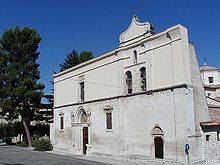Sulmona
A tradition alluded to by Ovid and Silius Italicus, which ascribed its foundation to Solymus, a Phrygian and one of the companions of Aeneas, is evidently a mere etymological fiction.
[7] In all events it is certain that Sulmo was a well-peopled and considerable town in 49 BC, when it was occupied by Domitius Calvinus with a garrison of seven cohorts; but the citizens, who were favorably inclined towards Julius Caesar, opened their gates to his lieutenant M. Antonius as soon as he presented himself.
[10] From the Liber Coloniarum we learn also that it had received the status of a colony, probably in the time of Augustus;[11] though Pliny does not give it the title of a Colonia.
[12] The chief claim to fame of Sulmona is derived from its having been the birthplace of Ovid, who repeatedly alludes to it as such, and celebrates its salubrity, and the numerous permanent streams of clear water in which its neighbourhood abounded.
One of the earliest bishops was Saint Pamphilus (San Panfilo), an Italian pagan convert to Christianity in the 7th century from nearby Corfinium.
Under Frederick II an aqueduct was built in the town, one of the most important constructions of the era in the Abruzzo; the emperor made it the capital of a large province, as well the seat of a tribunal and of a fair, which it however lost with the arrival of the Angevins, becoming part of the Kingdom of Naples.
While much of the medieval city was destroyed by the earthquake, some remarkable buildings survive such as the Church of Santa Maria della Tomba, the Palazzo Annunziata, the Aqueduct and the Gothic portal on Corso Ovidio.
Sulmona experienced an economic boom in the late 19th century, becoming a railway hub given its strategic geographic position between Rome and the Adriatic coast.
The anarchist and labour organiser Carlo Tresca was born there in 1879 and was active in the Italian Railroad Workers' Federation until emigrating to the US in 1904 to escape a prison term.
In September 1943, as the Italian government neared collapse, the inmates of Sulmona heard rumours that the evacuation of the camp was imminent.
On 14 September, German troops arrived to escort the prisoners northwards, to captivity in Germany, but not before hundreds of them had escaped into the hills.






